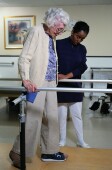- 8 Ways to Increase Dopamine Naturally
- 7 Best Breads for Maintaining Stable Blood Sugar
- Gelatin vs. Collagen: Which is Best for Skin, Nails, and Joints?
- The Long-Term Effects of Daily Turmeric Supplements on Liver Health
- Could Your Grocery Store Meat Be Causing Recurring UTIs?
- Are You Making This Expensive Thermostat Error This Winter?
- Recognizing the Signs of Hypothyroidism
- 10 Strategies to Overcome Insomnia
- Could Artificial Sweeteners Be Aging the Brain Faster?
- Techniques for Soothing Your Nervous System
Walking Speed a Good Gauge of MS Disability, Study Says


WEDNESDAY, Oct. 30Measuring the walking speed of multiple sclerosis patients can help doctors assess progression of the disease and the severity of disability, a new study suggests.
In people with multiple sclerosis (MS), the immune system damages the protective myelin sheath around the body’s nerves.
“We already know that the timed 25-foot walk test is a meaningful way to measure disability in MS,” study author Dr. Myla Goldman, of the University of Virginia in Charlottesville, said in a news release from the American Academy of Neurology. “Our study builds on that research by providing a clearer idea of how walk time can provide information about how a person’s disease progression and disability impacts their everyday activities and real-world function.”
The study included 254 MS patients who were timed as they walked 25 feet. Those who took longer than 6 seconds to walk that distance were more likely to be unemployed, to have changed jobs because of MS and their walking ability, to use a cane, and to require help with daily activities such as cooking and house cleaning.
For example, 59 percent of those who took less than 6 seconds to walk 25 feet were employed, compared to 29 percent of those who took longer than 6 seconds. Just 43 percent of the faster walkers had changed jobs because of MS, compared to 71 percent of slower walkers.
Patients who took 8 seconds or longer to walk 25 feet were more likely to be unemployed, to use Medicaid or Medicare, be divorced and use a walker. They were more than 70 percent more likely to be unable to perform daily activities such as house cleaning, grocery shopping, laundry and cooking, according to the study published online Oct. 30 in the journal Neurology.
Based on the study findings, “we propose that a timed 25-foot walk performance of 6 seconds or more and 8 seconds or more represent meaningful benchmarks of MS progression,” Goldman added in the news release.
More information
The American Academy of Family Physicians has more about multiple sclerosis.
Source: HealthDay
Copyright © 2026 HealthDay. All rights reserved.










